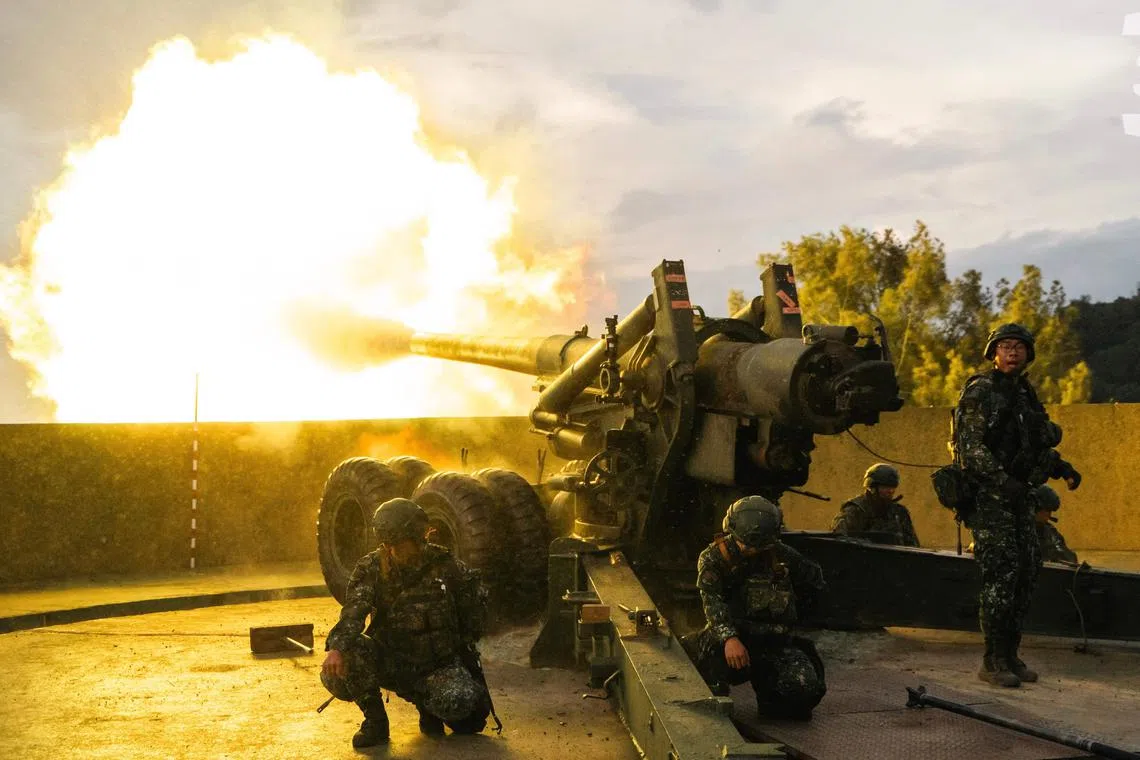Taiwan’s defence spending to outpace GDP growth as China threat rises
Sign up now: Get insights on Asia's fast-moving developments

Taiwan’s Cabinet said that 2025 defence spending would rise to NT$647 billion (S$26.4 billion).
PHOTO: AFP
TAIPEI - Taiwan’s spending on defence will rise 7.7 per cent in 2025, outpacing expected economic growth, its Cabinet said on Aug 22, as the island adds more fighter jets and missiles to strengthen deterrence against a rising threat from Beijing.
China, which views democratically governed Taiwan as its own territory, has ramped up military and political pressure over the past five years to assert those claims, which Taipei strongly rejects.
Taiwan’s Cabinet said, following a regular weekly meeting, that defence spending in 2025 would rise 7.7 per cent year on year to NT$647 billion (S$26.5 billion), accounting for 2.45 per cent of gross domestic product (GDP) – up from 2.38 per cent in 2024 – and exceeding the government’s expectation for economic growth of 3.26 per cent for the year.
The spending includes a special budget worth NT$90.4 billion to buy new fighter jets and ramp up missile production. That was part of the military’s extra spending worth NT$240 billion announced in 2021 over five years.
Mr Hsieh Chi-hsien, head of the Defence Ministry’s comptroller bureau, told reporters that defence spending reaching 3 per cent of GDP was a goal it was hoping to reach, and that at the moment, Taiwan’s defence spending is “growing steadily”.
“We will not join in an arms race with other countries. We will increase (spending) steadily according to our needs,” he said.
Future spending also depends on whether Taiwan could acquire “key and important” equipment, Mr Hsieh added, without elaborating.
Taiwan’s government has made military modernisation a key policy platform and has repeatedly pledged to spend more on its defences, given the rising threat from China, including developing made-in-Taiwan submarines.
China’s air force flies almost daily missions into the skies near Taiwan and, in May, staged war games around the island
The budget will still need to be passed by Parliament, where the ruling Democratic Progressive Party (DPP) lost its majority in January elections.
Taiwan’s main opposition party, the Kuomintang, has repeatedly expressed its support for firming up the island’s defences, though it is currently involved in a stand-off with the DPP about contested reforms to give Parliament greater oversight powers that the government says are unconstitutional.
China is also rapidly modernising its armed forces, with new aircraft carriers, stealth fighter jets and missiles.
China in March announced a 7.2 per cent rise in defence spending
Successive US administrations have pushed Taiwan to modernise its military and spend more. The US is Taiwan’s most important arms provider and international backer, despite the absence of diplomatic relations.
Speaking at a security forum in Taipei on Aug 21, Mrs Nikki Haley, a UN ambassador under the Trump administration, praised Taiwan’s commitment to spending more on defence. “Other free nations should learn from them, especially many US allies,” she said. REUTERS


